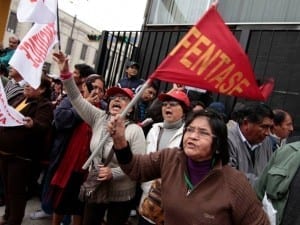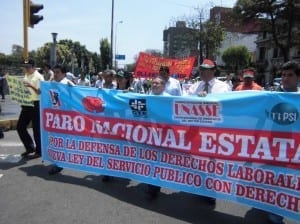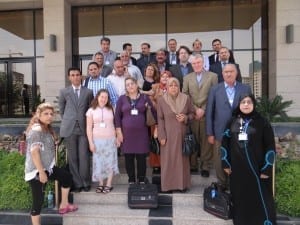Feb 3, 2014

Honduran union leader Victor Crespo is among Central American unionists threatened with death. Credit: IUF
The murder last week of Victor Manuel Crespo Puerto, father of Honduran union leader Victor Crespo, is the latest in a deadly turn for trade unionists in Central America. Already this year, two unionists have received death threats in Honduras, one unionist has been murdered in El Salvador and, in Guatemala, one unionist has been murdered and 11 others fired upon.
Since 2009, the year of the presidential coup in Honduras, 31 trade unionists, 57 rural workers and 28 journalists have been murdered there. This anti-union violence is part of climate of violence that gives Honduras the distinction of being the nation with the world’s highest per capital murder rate. Not coincidentally, Honduras also has the highest income inequality in Latin America.
Guatemala, where 65 trade unionists have been assassinated since 2009, now has surpassed Colombia as the most deadly nation in the world for union members. Most recently, Marlon Dagoberto Vásqez Lόpez, 19, a member of the construction worker union was murdered in January. Also last month, gunfire was sprayed on 11 members of the banana worker union as they held a meeting. The National Police never came to the crime scene and no one has been jailed for any such murders in recent years.
The murders and death threats are the culmination of “widespread violations” of workers’ most basic rights, said Stephen Benedict, director of the Human and Trade Union Rights department at the International Trade Union Confederation (ITUC). Workers “daily contend with harassment, interventions from employers and government officials in union matters and ultimately death threats and assassinations.”
Crespo, leader of the port workers union Sindicato Gremial de Trabajadores del Muelle (SGTM), was threatened with death and in September, his home was attacked by armed men yelling that he should “stop making noise organizing stevedores.” He left the country soon after. His father and other family members were targeted this week by an armed assailant who ran them down.
Crespo’s colleagues in SGTM leadership are now receiving death threats. The International Transport Workers’ Federation (ITF) and SGTM believe they are connected to the union’s lawful request for a collective bargaining agreement at the port and workers’ request to receive their legally-required benefits. Despite meetings between the ITF and Honduran security and government officials, the government has taken no serious action to increase security nor act on SGTM’s requests for a collective bargaining agreement.
Other incidents in Honduras since January 1 include:
- Increasingly frequent and specific death threats against José Maria Martinez of the FESTAGRO banana and agricultural worker federation. Martínez, host of a daily trade union radio show for the past 20 years, worked closely with workers at the Tres Hermanas banana plantations as they pushed to win a collective bargaining agreement in the face of harsh employer repression.
- Intimidation and a death threat directed at Nolvia Aracely Paz Rivera, a member of the construction workers’ union SIGTRACOH and community leader in Cofradia. Hooded gunmen have circled her home where she lives with her three children. SIGTRACOH, a Solidarity Center ally, has been active in the community, meeting with workers interested in community development as well as broader engagement to restore democracy in the country. Members of the union have faced harassment, threats and violence.
Last November, Serafin Alas, another SIGTRACOH member in Cofradia, was murdered. Jacinto Cortez, an informal construction worker from the community, was killed earlier last year. Union leaders say nearby police have delayed their responses from 20 minutes to two hours after they receive calls for help.
The Solidarity Center joins Honduran and Guatemalan labor federations and the Trade Union Confederation of the Americas (TUCA-CSA) in demanding prompt investigations of these attacks against union members, and has urged the governments of both countries to find the perpetrators and define a policy and actions to guarantee the life and physical integrity of union members and freedom of association.
Feb 1, 2014

Public employees in Peru rally against a civil service law that takes away collective bargaining rights (above and below). Photos: Marcela Arellano Villa
Seeking to reach a collective bargaining agreement with the Peruvian government, three public-sector union confederations presented a joint petition to government officials in recent days. The bargaining proposal includes the freedom for workers to form unions, and stresses that worker rights should not be negated even though civil service is a “vocation and calling.”
Peruvian unions took inspiration from their brothers and sisters in Colombia, Argentina and Uruguay, who have negotiated similar industry-wide collective bargaining agreements.
The industry-wide bargaining proposal “is an opportunity to advance respect for freedom of association and collective bargaining in the public sector, which are currently under threat,” said Jorge Villa Garcia, deputy secretary general of the National Federation of Administrative Workers in the Education Sector (FENTASE). “It’s a chance for us to negotiate fair wages and establish agreements that will prevent conflict and help us build a better Peruvian civil service.” Villa Garcia is also Public Services International (PSI) coordinator for Peru
 Last July, the government passed a new civil service law that eliminated the right of more than 500,000 public administration workers to collectively negotiate salaries, narrowed the definition of the type of unions they may establish and prevents “essential service” unions from striking (without defining essential services).
Last July, the government passed a new civil service law that eliminated the right of more than 500,000 public administration workers to collectively negotiate salaries, narrowed the definition of the type of unions they may establish and prevents “essential service” unions from striking (without defining essential services).
The International Labor Organization (ILO) has criticized the new law for its unfair restrictions on collective bargaining and the right to strike. Some members of the Peruvian Congress and human rights organizations have noted that portions of the law are contrary to international labor legislation and say it provides no mechanisms to promote the provision of quality public services. Three separate lawsuits charge the civil service law violates the constitution, and members of the Peruvian Congress have sponsored five bills to modify it.
Peru’s new civil service law is part of a “second generation” of neoliberal state reform that includes the country’s privatization of its health, education and other public services, actions that entail the elimination of many public-sector jobs, according to PSI. Public-sector worker rights are under attack in Latin America and elsewhere around the world, even as rising inequality and lack of jobs, especially for young workers, further limit the ability of working people to support themselves and their families.
The Solidarity Center actively assists public-sector workers in defending their rights across the Andean region, including in Peru, Ecuador and Colombia, and in coordination with PSI, the global union federation that represents public-sector workers worldwide.
Jan 27, 2014
The Dominican Republic and Haiti remain in talks regarding a Dominican Republic court ruling last September that retroactively revokes the citizenship of all Dominicans born in the country to undocumented parents as far back as 1929. The ruling affects tens of thousands of Dominicans, the large majority of whom are of Haitian descent.
Protests against the ruling continue to take place worldwide, with active opposition by the international community and human rights defenders. As part of a broad coalition of labor and human rights groups, the National Council of United Trade Unions (CNUS), sent letters to Dominican Republic President Danilo Medina denouncing the ruling. CNUS, a Solidarity Center ally based in the Dominican Republic, also provided testimony to an Inter-American Commission on Human Rights (IACHR) delegation which traveled to the country to assess the situation.
The Asociación de Trabajadores del Hogar (Domestic Workers Association, ATH) held a forum to raise awareness among members and express solidarity with those affected by the ruling. In a joint statement from the International Trade Union Confederation’s (ITUC) regional body for the Americas, TUCA, Haitian and Dominican unions signed on to condemn the ruling’s violation of human rights and urged the Dominican government to take steps to prevent a humanitarian crisis.
The Dominican Republic has long relied on Dominicans of Haitian descent and Haitian migrant workers to provide cheap labor in the agricultural, construction and domestic work sectors of the informal economy, which is characterized by low wages, no benefits, unsafe working conditions and weak legal protections.
Given the precarious nature of the work, coupled with a heightened fear of deportation, Dominican workers of Haitian descent are more vulnerable to rights abuses and are at greater risk of human trafficking, debt bondage and being compelled to take dangerous jobs.
Dominican-American author Junot Diaz described the ruling as making it challenging for those of foreign descent to “study; to work in the formal sector of the economy; to get insurance; to pay into their pension fund; to get married legally; to open bank accounts; and even to leave the country that now rejects them if they cannot obtain or renew their passport. It is an instantly created underclass set up for abuse.”
The Solidarity Center shares the demands of its Dominican and Haitian union partners, the ITUC, TUCA and the AFL-CIO in calling on the Dominican government to comply with all international human rights obligations and immediately recognize the birthright citizenship of all Dominicans of foreign descent deprived of their nationality by the ruling.
For more information, download a Solidarity Center factsheet.
Jan 22, 2014

Iraqi union leaders and Solidarity Center staff last May. Credit: Solidarity Center
Update: The draft version of Iraq’s new labor law emerged from Parliament in recent days but falls far short of protecting workers freedom to collectively bargain, according to Iraqi union leaders.
On Friday, Iraqi union leaders expressed their concerns to members of Parliament at a Solidarity Center-sponsored conference, and union leaders have written a letter to the Speaker of Parliament in which they detail the proposed law’s shortcomings. Read the letter in English and Arabic. The AFL-CIO also has written to the Speaker of Parliament expressing “deep disappointment” that the proposed legislation “contains several provisions that violate international standards.” Read the AFL-CIO letter.
January 10, 2014—The Iraqi Parliament is currently debating legislation that for the first time could contain worker rights protections in line with core labor standards, including freedom of association. The law would replace the 1987 labor law passed by Saddam Hussein’s regime.
The vote comes nearly a decade after the Inetrnational Labor Organization (ILO) first worked with the government of Iraq to draft new legislation. The ILO commented on drafts in 2007 and 2012, finding them severely inadequate in regards to protecting the rights of workers, in particular freedom of association.
Six major Iraqi labor unions, together with the Solidarity Center, have worked since June 2012 to bring proposed changes to the nation’s draft labor law in line with International Labor Organization (ILO) conventions. In addition, the Solidarity Center facilitated meetings among the unions and the labor committee in parliament, the Iraqi Ministry of Labor and Social Affairs, and the International Trade Union Confederation (ITUC) and the ILO, which provided recommendations based on ILO conventions. The labor federations launched a public advocacy campaign for passage of the labor law, and have received strong support from the global labor movement, including global union federations, the AFL-CIO and the British Trade Union Congress (TUC).
On a parallel front, a new union law that would replace the 1987 Trade Union Law had its first reading in Parliament this week. The 1987 Trade Union Law bans public-sector unions, which include the majority of Iraqi workers, restricts union pluralism and allows government interference in internal union affairs.
The Solidarity Center has worked closely with the Iraqi labor movement to secure passage of the new trade union law that protects freedom of association for all workers. Parliament plans to hold its second reading before the end of January, after which Iraqi unions will advocate for Parliament to vote on it before the current session ends in April.
Jan 22, 2014
Nearly 202 million people were unemployed in 2013 around the world, some 5 million more than in 2012, because the number of jobs is not keeping pace with the growing workforce. As the world’s elite meet in Davos, Switzerland, this week to discuss global economics, the International Labor Organization (ILO) released its annual jobs report, showing how much work must be done to ensure workers can support themselves and their families.
Global Employment Trends 2014 also finds:
• Young people are especially hard-hit. Some 74.5 million people age 15–24 were unemployed in 2013, nearly 1 million more than in 2012.
• Vulnerable employment—self-employment or work by contributing family workers—accounts for nearly 48 percent of total employment. Workers in vulnerable employment have less secure income than wage and salaried workers, and limited or no access to health care and pension coverage.
• Regionally, most of the increase in unemployment is in East Asia and South Asia, which together represent more than 45 percent of additional jobseekers, followed by sub-Saharan Africa and Europe.
• Informal employment remains widespread in most developing countries. Even in regions making reductions in poverty, lack of formal employment opportunities hinders further poverty reduction.
• Although the number of working poor continues to decline globally, some 839 million workers—the working poor—live on less than $2 a day.
• Some 23 million people are estimated to have dropped out of the labor market because they are discouraged about finding a job.
Read the full report.




